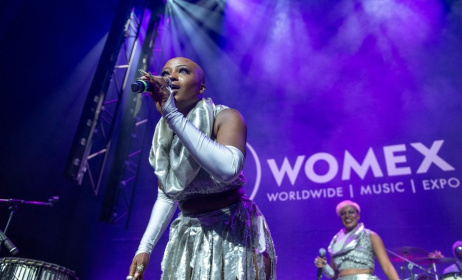SA: Industry players gather at Moshito
The 2017 Moshito Conference and Exhibition was a multinational melting pot of ideas and perspectives about the music industry in Africa and abroad. During the conference, panellists from around the world engaged each other on topics to inform the music industry and look at ways to develop young artists. This year’s theme, Rhythms of the Ancients, sought to make the conference one in which the identity of musicians in relation to music was central.
 Chairperson of the Moshito board Sipho Sithole reciting a poem.
Chairperson of the Moshito board Sipho Sithole reciting a poem. Swazi artist Mandisa attended Moshito to network.
Swazi artist Mandisa attended Moshito to network. Kenyan musical couple Nina Ogot and Winyo.
Kenyan musical couple Nina Ogot and Winyo. An artist performs during the demo presentation session.
An artist performs during the demo presentation session. An artist plays his guitar during the demo presentation session.
An artist plays his guitar during the demo presentation session.
The conference took place at Newtown Music Factory (former Bassline) in Johannesburg’s Newtown Cultural Precinct from 6 to 9 September. It hosted delegates from Uganda, Swaziland, Cape Verde, Brazil and Morocco, among others. The marquee that was erected for the event was a place of interaction and served as an exhibition space where exhibitors included the Southern African Music Rights Organisation (SAMRO), the Recording Industry of South Africa (RiSA), Standard Bank Joy of Jazz and Native Rhythms. The centrepiece of the marquee was a stage on which various artist performed in between discussions.
Audiences were entertained by a cultural group before the panel discussions began. Even the chairperson of the Moshito board, Dr Sipho Sithole, performed a poem.
The first topic on the agenda was questioning whether or not the rhythms of the ancients were still relevant. The panel seemed to agree that young artists had lost their culture and had little regard for it when creating music. The solution to this problem, they proposed, was that young artists acknowledge their cultural backgrounds. The theme largely focused on how upcoming artists should incorporate indigenous African sounds into their music to create unique compositions as opposed to copying the works of American and European artists.
Decolonising the Airwaves, The Gospel in Me: Lifestyle or Calling? and Scooping That Award were three topics that caused heated debate among the audience and panellists. The panellists tried to elucidate the topics, but the theme that persisted throughout was copyright and royalties, with participants agreeing there was a great need for education on the matter.
The panellists discussing the idea of decolonising the airwaves primarily dwelled on the hypothesis that there is a demand for local content and as such it should be delivered. The conversation was premised on the 90% local content policy that was implemented by the South African Broadcasting Corporation (SABC) in 2016. Dichaba Phalatse of the SABC said public stations Metro FM, 5FM and Good Hope FM were competing in the commercial space because “they generate revenue that subsidises the SABC’s African language radio stations”.
“If you don’t allow these three radio stations to generate revenue, you run the risk of playing 100% local content but without any money to pay royalties,” he said. The question posed was: “Why do advertisers attach more value to stations that play international content?”
Another panel discussion sought to offer advice on how to win a music award. The conversation digressed as the audience questioned the authenticity of awards in South Africa. Organisers have persistently denied any corrupt activities when winners are chosen, while a large sector of the music listening public maintains that various awards are handed out to the highest bidder. There was no consensus reached on the topic.
Aside from panel discussions, young artists were given the opportunity to showcase their latest music in a demo presentation competition. The music presented ranged from Afro-pop, kwaito, R&B and hip hop. Many hopefuls took the stage to battle it out for R20 000 ($1 600) in prizes.
Each day of the conference was followed by an evening of performances at the Soweto Theatre on Thursday and at Newtown Music Factory the following night. The gathering then culminated in a street festival in Newtown on Saturday.
“We enjoy Moshito because it brings together people from all walks of life. It is also inspiring. The performances we saw at Soweto Theatre were really great back-to-back shows,” Kenyan artists Winyo and Nina Ogot, who also performed at Moshito, said.


















Commentaires
s'identifier or register to post comments